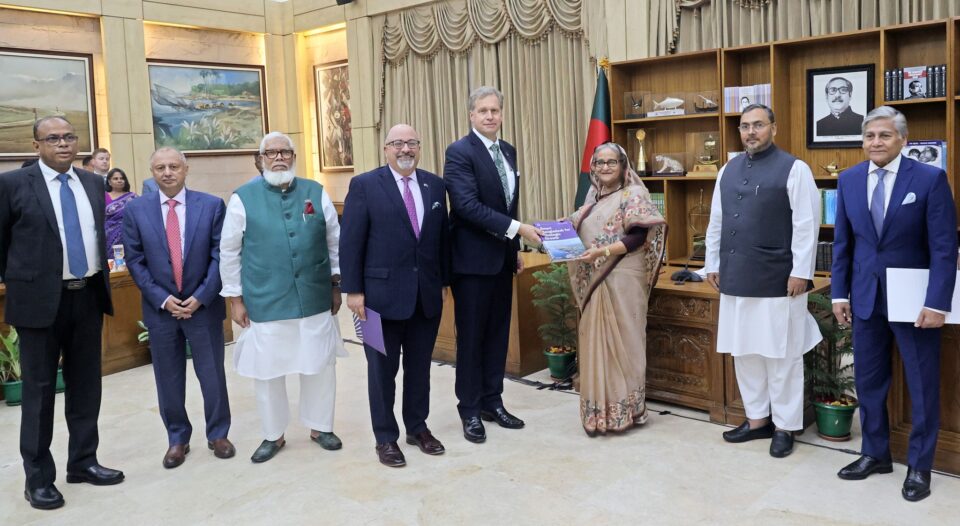Prime Minister Sheikh Hasina has sought the cooperation of American businesses to transform Bangladesh into a ‘developed and smart’ nation by 2041. She stated, “I invite you to become partners in our journey to achieve a ‘developed, prosperous, and smart’ Bangladesh by 2041.”
Sheikh Hasina made this appeal during a speech at her official residence, Ganabhaban, when a delegation from the US-Bangladesh Business Council paid a courtesy call.
She emphasized, “We aspire to become a ‘smart nation’ by 2041. We need your support to increase our global competitiveness and expand our export base.” She noted that Bangladesh will transition from a ‘least developed’ to a ‘developing’ country by 2026.
The Prime Minister reaffirmed her commitment to realizing the dreams of the Father of the Nation, Bangabandhu Sheikh Mujibur Rahman. She highlighted the significant socio-economic growth Bangladesh has achieved over the past 15 years.
“Today, Bangladesh is recognized worldwide as a ‘role model of socio-economic development.’ This success is attributed to good governance, the rule of law, stability, investment in the rural economy, women’s empowerment, and ICT, which has transformed the country into ‘Digital Bangladesh.'”
She mentioned that the United States has been a major economic and development partner for Bangladesh over several decades, with close engagement in many areas, particularly trade and investment.
“Our joint goal is to achieve mutual benefits and prosperity for our people, which is evident in our growing bilateral trade and interaction between our people,” the Prime Minister said.
Currently, the United States is the largest single-country destination for Bangladesh’s exports, the largest source of foreign direct investment, and a crucial provider of knowledge and technology. She expressed optimism about the future growth of this economic engagement.
In this context, Sheikh Hasina invited American investors to explore vibrant and high-potential sectors in Bangladesh such as renewable energy, shipbuilding, automobiles, pharmaceuticals, light and heavy machinery, chemical fertilizers, ICT, marine resources extraction, and medical equipment.
She expressed hope that the US-Bangladesh Business Council would play a significant role in advancing trade and investment cooperation between the two friendly nations. “Finally, I invite all American business leaders to take advantage of the opportunities in Bangladesh and invest here,” she added.
Furthermore, she mentioned that her government has established 100 ‘Special Economic Zones’ (SEZs) and 28 high-tech parks, with some already operational. Particularly in the IT sector, Bangladesh is an ideal investment destination with over one million freelance IT professionals.
The Prime Minister highlighted the availability of a young, skilled, and vibrant workforce at competitive wages as a significant advantage. “I would like to remind you that Bangladesh has the most liberal investment policy in the region. Rest assured, we prioritize improving our investment environment.”
At the end of the meeting, the Prime Minister’s speechwriter, M. Nazrul Islam, briefed the journalists, saying that the Prime Minister informed the American business delegation about the various initiatives she has taken since forming the government in 1996 to enhance investment opportunities.
Nazrul noted that American investors expressed their ambition to invest in Bangladesh but also pointed out some challenges that need to be addressed.
US-Bangladesh Business Council Chairman Steven Kobos gave the welcome speech, and its President, Ambassador (Retd.) Atul Keshap, proposed a vote of thanks.
Adviser to the Prime Minister on Private Industry and Investment Salman F Rahman, State Minister for Commerce Ahsanul Islam Titu, and Ambassador-at-Large Mohammad Ziauddin were also present. Prime Minister’s Principal Secretary M. Tofazzal Hossain Miah conducted the event.
Sheikh Hasina noted that the World Economic Forum has rated Bangladesh as the top country in South Asia for women’s empowerment and among the top 10 globally for women’s political empowerment.
She mentioned that Bangladesh, with a market of 170 million people and its geographical location, serves as a hub for a market of 3 billion people. Its increased connectivity with neighboring countries makes it an ideal place for investment and trade in the region and beyond.
“Our focus now is not only regional but also on enhancing economic and trade relations with global partners, including the United States,” said the Prime Minister.
Highlighting the implementation of several mega infrastructure projects over the past 15 years, she mentioned the bridge over the Padma River, metro rail in Dhaka, tunnel under the Karnaphuli River, expressways, a modern international airport in Dhaka, and power plants.
She noted that legal and financial infrastructures are also being improved, which have boosted both internal and regional connectivity.
Bangladesh is currently one of the fastest-growing economies in the world. It is now the 35th largest economy and is projected to become the 25th largest by 2030. This growth is due to a vibrant private sector, with significant contributions from American businesses.
The Prime Minister pointed out that Bangladesh leads in many socio-economic indicators in South Asia. “Due to our planned development efforts, the poverty rate has dropped from 41% in 2005 to 18.7% in 2022, and the extreme poverty rate has decreased to 5.8%. Over the past decade, GDP growth has been above 6%.”
Additionally, life expectancy, which was 46.6 years after independence in 1971, has now increased to 73.4 years. “Now, almost all children complete primary school. Notably, the female literacy rate is 73.25%, higher than the South Asian average of 65%,” she concluded.

